Israel-Hamas War: What happened on day 105?
The IDF downed a Lebanese drone attempting to penetrate Israeli airspace • Rocket sirens sounded in Haifa • Hamas delegation visits Russia
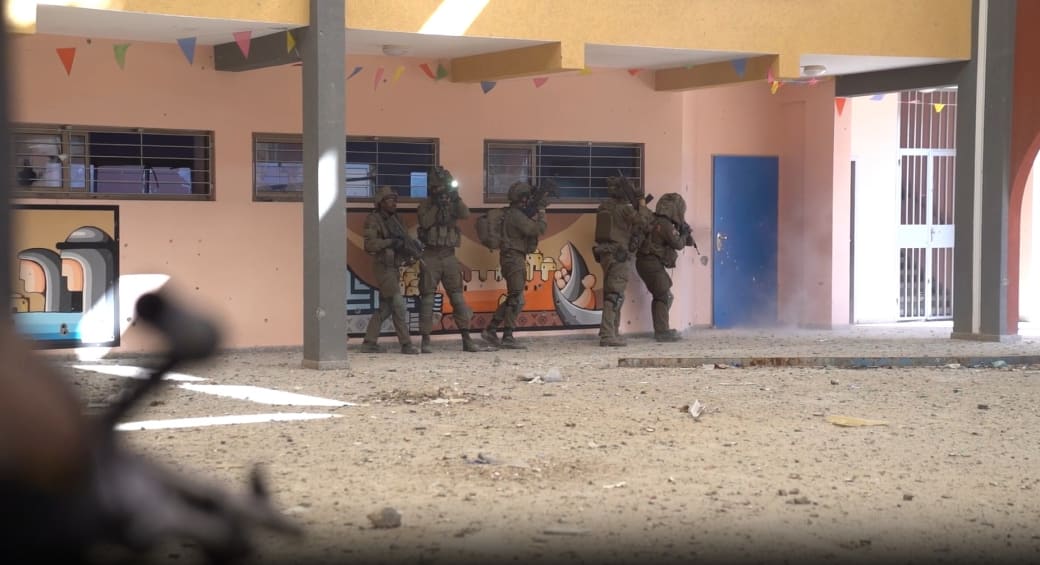

IDF strikes Islamic Jihad leader released in Gilad Schalit deal
Wael Abu-Fanounah was originally arrested in Israel on December 12, 1989, and was sentenced to three life sentences for his terrorist activities.
Deputy Head of Information for the Palestinian Islamic Jihad organization Wael Makin Abdallah Abu-Fanounah was targeted and killed by the IDF in an airstrike on Thursday, the military announced on Friday in a joint statement with the Israel Security Service (Shin Bet.)
Fanounah was originally arrested in Israel on December 12, 1989, and was sentenced to three life sentences for his terrorist activities, but was released in 2011 as part of the Gilad Schalit prisoner deal.
Fanounah then served as deputy to Khalil al-Hayya, the Northern Gaza Strip Commander of the Palestinian Islamic Jihad. Since 2017, before assuming his role as deputy head of the organization's Information Network, Fanounah was responsible for producing terror videos related to rocket attacks on Israeli territory and creating and disseminating documentation of Israeli captives as part of the psychological warfare conducted by terror groups in Gaza against Israeli residents.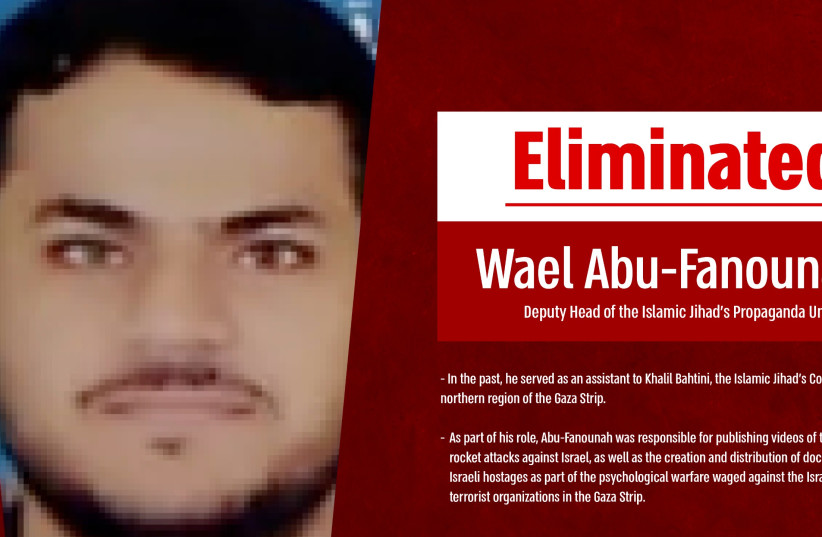
IDF continues battling in Gaza
IDF troops are continuing to operate within Gaza, coordinating with the Israeli Air Force to conduct precise strikes based on the information received from the ground.
Soldiers from the 179th 179th Armored Brigade "Ram" came under fire from terrorists armed with RPGs in central Gaza on Thursday. Subsequently, the soldiers scanned the area and the structure where the terrorists were operating, discovering RPG launchers, Kalashnikov rifles, and military equipment.
In the northern sector of Gaza, the 5th "Sharon" (Reserve) Infantry Brigade neutralized several armed terrorists involved in recent attacks on IDF troops that occurred in northern Gaza. The soldiers attacked and killed the militants with the assistance of tank fire and aerial support from the Air Force.
Israel's emergency government close to collapse as Gaza war continues
The question is no longer whether an election will take place in 2024, but rather when in 2024.
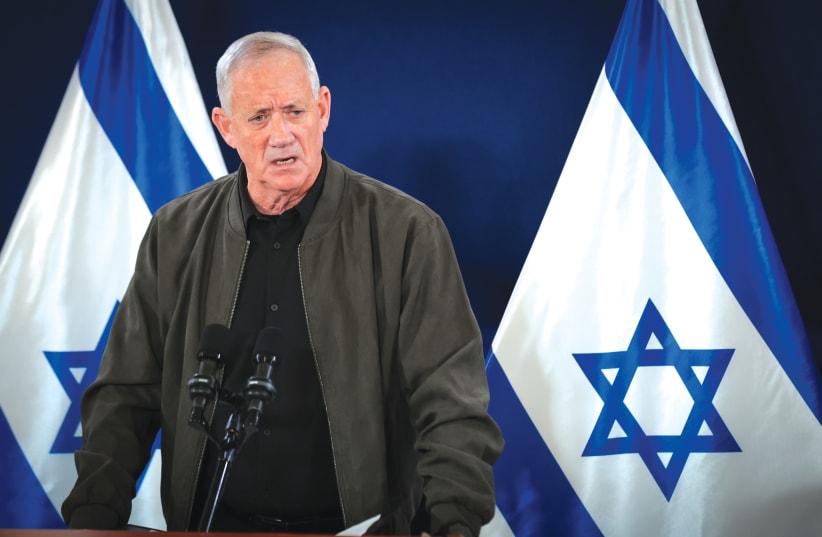
‘The Americans have realized that Prime Minister Benjamin Netanyahu is incapacitated because of the political situation he is in,” a senior official from one of Israel’s opposition parties informed me last week.
“In fear of voters’ reaction, moreover, Netanyahu has even gone as far as to conceal his transition to Stage 3 of the war not only from his own war cabinet, but also from the general public.”
Netanyahu’s political predicament is already straining the Biden administration’s patience, with a growing sense that they are providing considerable support without receiving anything from him in return.
While the Americans are compelled to take Netanyahu’s political affairs under consideration, he, in turn, is unwilling to extend the same goodwill gesture toward the Democratic candidate currently residing in the White House, who is facing a challenging and tumultuous reelection campaign.
There is a reason why John Kirby, the US’s National Security Council spokesperson, stated this week that Israel has already shifted to a low-intensity conflict in the North and is expected to undergo a similar transformation in regard to the South.
This completely contradicts Netanyahu’s assertion the previous day, in which he claimed that warfare has intensified in the southern region of the Gaza Strip. The Americans are exposing Netanyahu’s bluff, despite his attempts to keep the Israeli public in partial darkness concerning the way this war is being conducted.
The butterfly effect of the intensifying voices of unease emanating from Washington is creating ripples that are impacting Jerusalem’s political landscape. Even at this stage of the war, marked by slow progress and by military achievements that are not apparent to an untrained eye, there is room for freedom of thought in terms of the political possibilities that could follow.
Go to the full article >>Gaza doctor amputates niece's leg at home, without anesthesia
Intense fire made it impossible to reach nearby hospital
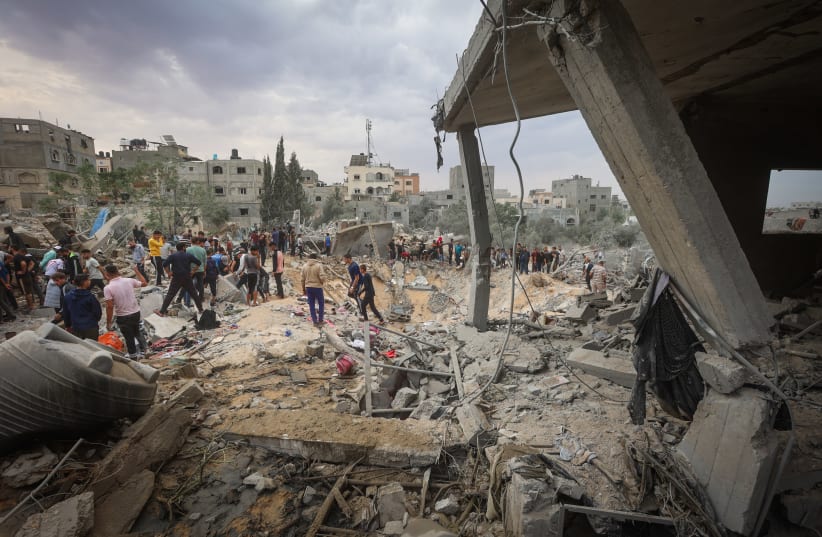
Palestinian doctor Hani Bseiso faced an agonizing decision when his teenage niece was wounded by Israeli shelling of her Gaza City home: amputate her leg or risk her bleeding to death.
Unable to reach a nearby hospital, and using little more than a pair of scissors and some gauze he had in his medical bag, he removed the lower part of A'Hed Bseiso's right leg in an operation carried out on the kitchen table without anesthetic.
Grainy video footage that went viral on Instagram shows him wiping the bloody stump of her right leg as she lies on the table. One of her brothers holds her steady, another holds up two mobile phones to provide better lighting.
The house is only 1.1 miles (1.8 km) from Gaza's Al-Shifa hospital, usually a six-minute drive or a 25-minute walk away, but Bseiso said intense Israeli fire in the area made it too dangerous to try to get there.
"Unfortunately, I did not have any other choice. The choice was that I either let the girl die or I try to the best of my abilities," Bseiso told Reuters this week in an interview in the room where he amputated her leg on Dec. 19.
Reuters was unable to confirm independently what struck her home, why it came under fire and what events preceded the attack.
Go to the full article >>UN rights official says Gaza detainees ill-treated and humiliated
A UN human rights official on Friday called for an end to Israel's ill treatment of Palestinian detainees in Gaza, saying he had met men who had been held for weeks, beaten and blindfolded, with some released in diapers.
"These are men who were detained by the Israeli security forces in unknown locations for between 30 to 55 days," said Ajith Sunghay, a UN human rights representative told reporters by video link from Gaza, who met with released detainees in the enclave. "There are reports of men who are subsequently released, but only in diapers without any adequate clothing in this cold weather."
Go to the full article >>Israel accused of jailing as many 'journalists' as Iran in CPJ report
Despite CPJ's claims, the IDF stresses that "journalists" arrested in Gaza are connected to Hamas and other terror organizations in the Strip.
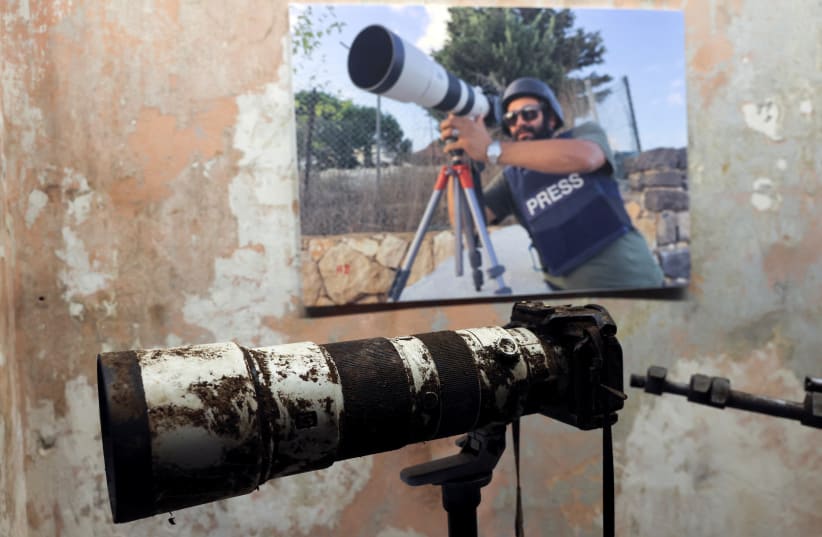
Following the October 7 attack, Israel is tied with Iran in sixth place on a list of the world’s leading jailers of journalists, the Committee to Protect Journalists’ (CPJ) 2023 prison census has found. Iran and Israel are listed behind China, Myanmar, Belarus, Russia, and Vietnam.
Despite CPJ's claims, the IDF stresses that "journalists" arrested in Gaza are connected to Hamas and other terror organizations in the Strip. Earlier this month, it presented evidence to prove that two Gazan journalists killed by the IDF were terrorists.
On the census date of December 1, 2023, CPJ documented 320 imprisoned journalists worldwide, the second-highest number recorded by CPJ since the census began in 1992. China, Myanmar, and Belarus held more than a third of those incarcerated on the day of the census, with 44, 43, and 28 behind bars, respectively.
CPJ's list has featured Israel in previous reports but recorded the highest number of arrests of Palestinian journalists since they began recording cases in the region in 1992. With the current war between Israel and Hamas, the report focuses on those who were arrested in the West Bank post-October 7.
The report cites data collected by the organization that the majority were held in administrative detention as of a December 1 census. Administrative detention would allow detention without charges because security forces believe the detainee may be able to plan another offense.
The CPJ says that these procedures are closed and made it difficult for the organization to find credible information on accusations against journalists in the region. The report says that several families reached out regarding family members who were jailed for what they believed were social media postings.
The report claims that "more than" 20 journalists had been detained since the beginning of the war, but did not include those released before December 1 in the 2023 numbers.
Go to the full article >>Israel's Gallant, US counterpart Austin speak on Gaza war, hostages
Defense Minister Yoav Gallant spoke with his US counterpart Secretary of Defense Lloyd Austin on Thursday, the Defense Ministry announced on Friday.
The two discussed the ongoing Israel-Hamas War and the return of the Israeli hostages held by Hamas in Gaza.
Gallant briefed Austin on operational developments in the war, including achievements in the efforts to dismantle Hamas's terror infrastructure in Gaza, and the threat posed by Hezbollah on Israel’s northern border.
The two also discussed the humanitarian situation in Gaza and measures taken by the IDF to distinguish the civilian population from Hamas terrorists.
Go to the full article >>IDF reveals 'Sinwar the Mouse' mural at urban training base
"We painted Sinwar as a mouse in a tunnel, aiming to make our fighters smile," artist Rotem Zamir said.
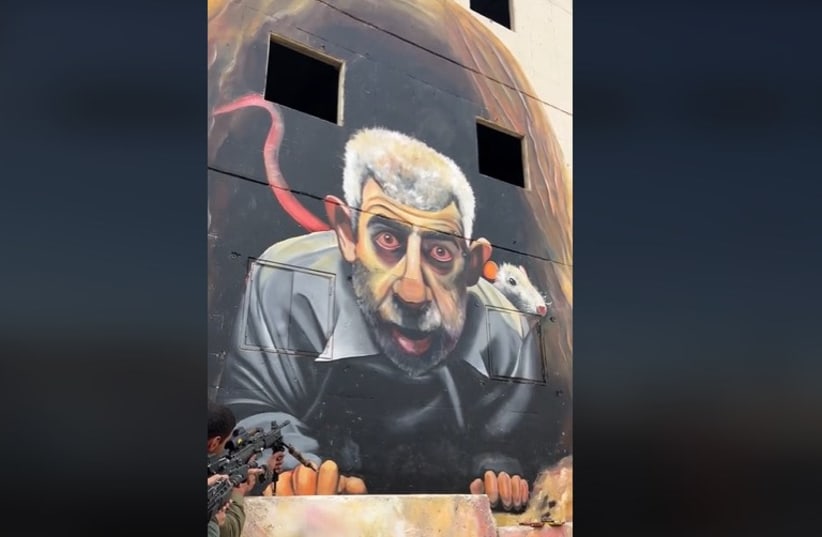
Most IDF combat soldiers will pass through the IDF's Urban Warfare Training Facility in Tze'elim at some point during their training. Also known as "Little Gaza," the base is outfitted to resemble a small Arab town, complete with mosques and murals of leaders such as Yasser Arafat and Hamas founder Ahmed Yassin.
A group of enterprising soldiers based at Tze'elim, however, decided to spruce up the walls of their base with a twist. Yahya Sinwar, leader of Hamas in Gaza and architect of the October 7 massacres in which 1,200 Israelis died, has been depicted as a mouse hiding in a tunnel.
@rotemzamir_ הפרוייקט המשותף שלנו במל״א- הלשביה הכי גדולה בצהל. החלטנו לצייר בצורה הכי מבזה את האוייב ולתת מוטיבציה ללוחמים שלנו ואפילו להעלות להם חיוך😁 בי אישית הציור העלה אמוציות, מה דעתכם על הציור? #צייריםצבאיים #ציירתצבאית #חרבותברזל #israel ♬ מי משוגע - דודא גאנג
"We, a team of four military artists, painted this mural," Channel 12 News quoted 20-year-old Rotem Zamir, who came up with the idea. "Usually, each one of us paints on different bases according to our command, but this time, we decided to do something together. We received a request from the base sergeant major, and because it was during the war, we tried to think of something that would boost morale and make our fighters smile.
"The Urban Warfare Training Facility is the largest in the IDF, and all soldiers pass through it, so we had a real dilemma about what to do, "Zamir said. "Usually, in intelligence units, they paint terrorists to create an atmosphere of combat against the enemy. There are plenty of paintings of [Hezbollah leader] Nasrallah, [Hamas military leader] Mohammed Deif, and others. We were supposed to paint terrorists, and usually, we don't choose what to paint, but this time we said, 'No more.' We are not willing to paint terrorists after what happened on October 7."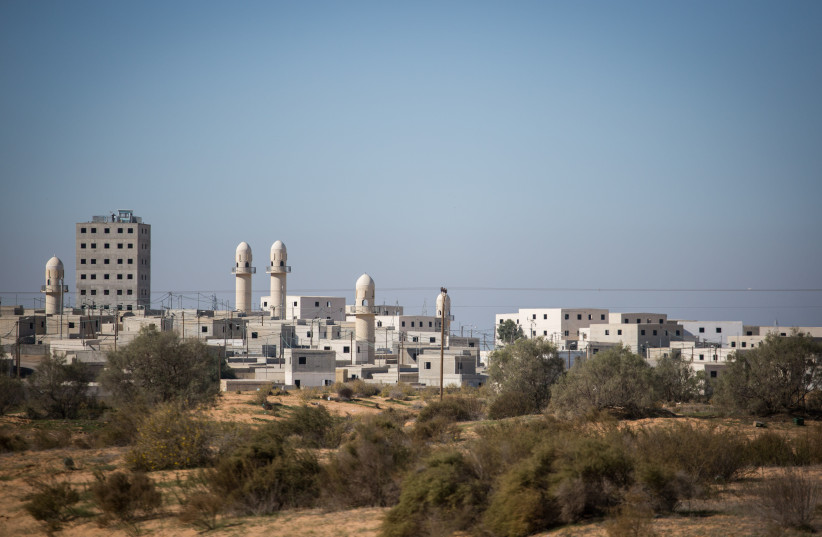
However, when in November, a group of Christian cowboys who came to Israel to volunteer began distributing decks of playing cards with photos of the most wanted Hamas terrorists to IDF soldiers in southern Israel and Gaza, including Sinwar, depicted as a mouse, Zamir had an idea.
"I saw it and said to my team, 'This is what we're painting,'" Zamir said. "We knew it would motivate every soldier passing through here; that was our goal."
The giant mural, which stands seven meters high, was painted by Zamir over four consecutive days, along with her partners Noam Shaked, Meir Ben Moshe, and Agam Moshe.
'Sinwar - keep hiding like a mouse in a tunnel'
"We painted Sinwar as a mouse in a tunnel, aiming to make our fighters smile," Zamir told Channel 12. "Underneath, we wrote a slogan in Arabic - 'You can keep hiding like a mouse in the tunnel, but we will reach you.'"
"When our officer came to see it a few days later, he was impressed," she added. "Senior commanders also passed by, and everyone who saw the painting liked it. It has become a symbol of the base. Every soldier passing through here takes a picture next to the mural."
The IDF is focusing its military efforts in Gaza on the tunnel system below the southern city of Khan Yunis, based on the Israeli military's belief that senior Hamas leaders, including Sinwar, remain hidden in the vast underground complex.
According to some estimations, Sinwar may have surrounded himself with remaining Israeli hostages, to be used as human shields, which would tie together the separate missions to locate and kill Sinwar together with the IDF's stated war goal of freeing the hostages.
Go to the full article >>An IDF reservist’s inside look at the destruction in Gaza - comment
REPORTER'S NOTEBOOK: I wish I could show what I saw to Yahya Sinwar and Mohammed Deif and ask them if this destruction was worth it.
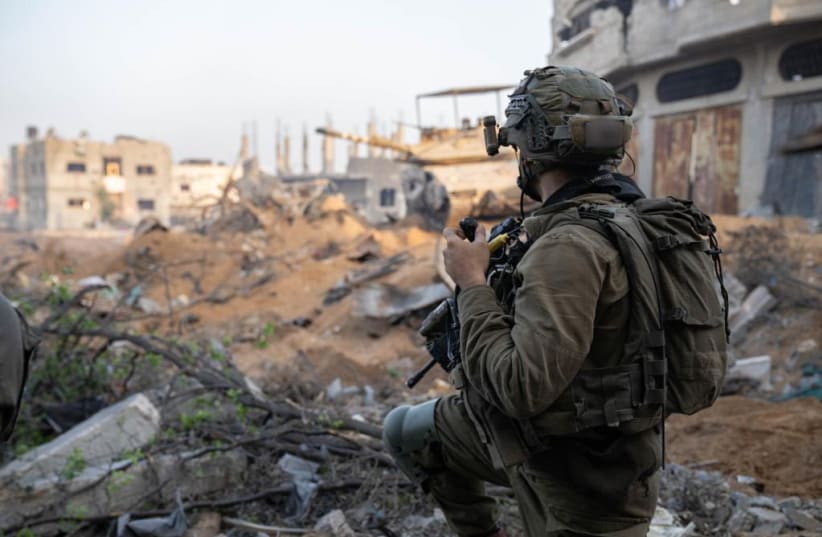
KHAN YUNIS, Gaza Strip – If the Khan Yunis area is indicative of the rest of the Strip, Gaza is in ruins. The destruction is a testament to the folly of the territory’s ruling power, Hamas – a shameful waste of everything Palestinians and their supporters claim to hold dear.
In the heart of the Bani Suheila Municipality, looking through a rifle scope and a meurtrière (arrowslit) carved into a wall, I couldn’t fathom why anyone would invite such a disaster upon their people and country. I couldn’t see a single building left unmarred by Hamas and IDF operations.
Apartments are riddled with holes from bullets of every relevant caliber, with chains of dark spots from Negev, FN MAG, and RPK machine guns; pockmarks from micro-Tavor, M4, and Kalashnikov rifles; deep gouges from sniper fire. The interiors of homes were laid bare by tank shells, the remnants of their exterior faces scarred by shrapnel from grenades, IEDs, RPG-7s, and LAWs.
The roads have been torn into dirt wadis, shaped by the treads of Merkava tanks and armored personnel carriers. Periodic winter squalls have filled putrid pools where swarms of chickens, ducks, cats, and dogs sate their thirst when they cannot rely on the goodwill of soldiers. When hungry, the myriad of farm animals dine on the garbage strewn in alleyways – spoiled food from refrigerators, stores, and the leftovers of soldiers.
Among the garbage, I found a leaflet dropped by the IDF, urging residents to flee the area so they would not be caught in the exchange of fire. The danger of civilian collateral damage had been abated by the warnings, the city emptied and turned into a ghost town.
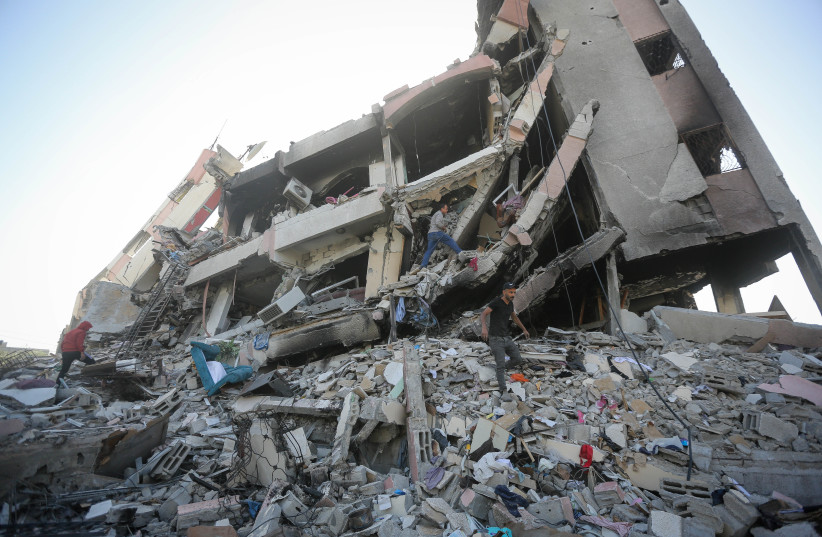
Gaza, by no means a paradise
Deep sandy pits have been dug in the ground in the search for the Hamas tunnels that honeycomb the city’s foundations. The corpse of one terrorist was found half-buried in the excavated sand. Many structures have been leveled as part of the anti-tunnel effort, or because they had been turned into IED-laden death traps or positions for sniper or anti-tank guided missile fire.
The Khan Yunis outskirts have been similarly scoured to rout the Hamas cells and hives of tunnels. The orchards and greenhouses were scraped from the earth by D9 military bulldozers searching for shaft entrances, usually in response to hit-and-run attacks launched by hiding terrorists. There is no greenery; everything has been rendered to the dull color of dirt.
Despite what would be believed from the propaganda pumped out by Gazan terrorist organizations for the consumption of naïve Westerners, Gaza seemed to have once been a fine place. While anti-Israel activists might have once believed that the Strip was an “open-air prison,” it was a place filled with life, with farms and orchards, stores, schools, and apartment buildings. There were beautiful homes filled with marble countertops, elaborately decorated salons, flat-screen televisions, smartphones, and modern amenities.
All these have been wasted by Hamas, and there is no pleasure to be had from such sights. Such destruction is the wages of war, willingly paid by Hamas terrorists just so they could wantonly slaughter Israelis. The October 7 massacre, which resulted in the loss of almost 1,200 lives and the kidnapping of hundreds, was an act of spiteful, suicidal hatred, intended to harm Gazan and Israeli citizens alike.
Hamas knew that Israel would need to remove the threat of further pogroms when it attacked; it knew that Israel would need to strive to free the captives, which could only be responsibly achieved with an unprecedented ground incursion.
Gaza was by no means a paradise, and there were many in poverty and unemployed. Yet the shame of Gaza is not just that Hamas sacrificed the territory it ruled for the opportunity of barbaric violence; it is also that the potential of the Strip had been wasted for the last 20 years.
Soldiers repeatedly remarked to me as we patrolled the ruins that Gaza could be an amazing place. It lies on a beautiful plot of land – a green coastal state bordering on a desert. There are villas that lord over orchards from atop hills with views of the Mediterranean Sea. The beaches could have drawn visitors from across the Middle East. The same coastline hosts successful Israeli cities, such as Tel Aviv, Ashkelon, and Ashdod.
Gazan cities could have rivaled their Israeli counterparts if the concrete and resources for hundreds of kilometers of underground terrorist infrastructure had instead been invested into civil amenities. Instead of producing unguided rockets to indiscriminately attack Israeli cities, munitions workshops could have been devoted to local industry.
I saw beautiful fields torn up during operations. These fields could have been fertile ground for a thriving Palestinian agricultural industry. Given the prominence of the Palestinian cause, Gazan olives and citrus could have been a boutique product sought across the world. Instead, Gaza’s chief export has been rockets and murder.
Gaza could have been another United Arab Emirates; it could have been a jewel of the Levant. Instead, it was yet another failed Middle Eastern kleptocracy.
The dream of the establishment of a Palestinian state could have been realized in Gaza. Instead, Hamas pursued nationalist irredentism and jihadist endeavors, not satisfied or appreciating what it had.
I wish I could show what I saw to Yahya Sinwar and Mohammed Deif and ask them if this destruction was worth it. But the evil of Hamas and those cheerleading their operations from the West is that the blood of Palestinians is cheap.
I hope from the ashes of Gaza, a new generation of Palestinian leadership will rise and see that the strategies pursued by Palestinian factions for the last 75 years do not work and are not worth acts of “resistance.”
I hope that together, we can rebuild Gaza, and that I can someday return to Khan Yunis not in uniform but as a guest of a thriving city.
The writer is an IDF reservist deployed in the Gaza Strip.
Go to the full article >>US, Biden increasingly frustrated with Netanyahu over Gaza war - analysis
President Joe Biden and his officials are becoming increasingly frustrated with Israeli Prime Minister Benjamin Netanyahu and his far-right coalition for not responding to the US's requests.

Signs of tension between the United States and Israel are continuing to grow, with reports suggesting that US President Joe Biden is "running out" of patience with Israeli Prime Minister Benjamin Netanyahu.
The friction is reportedly serious. One US news outlet quoted several US officials with direct knowledge of the issue saying that the two leaders have not spoken to each other since December 20, when Biden abruptly ended their phone call with the words, "This conversation is over."
Biden and other senior US officials are reportedly becoming increasingly frustrated with Netanyahu and his far-right government coalition for not responding positively to the Biden Administration's recent requests over the war in the Gaza Strip. This became obvious after Secretary of State Antony Blinken's most recent visit to the region.
US: Netanyahu 'unappreciative' of Biden's support
A US State Department official told The Media Line that the US is trying to portray a positive image and keep clear public support for Israel, but the White House is furious with Netanyahu, calling him "unappreciative" of Biden's efforts and unconditional support.

The official said that Blinken had hit a wall and was scrambling to find a way to deal with Netanyahu and his government.
"Biden gave Netanyahu a lot of credit. Of course, he gave Israel a lot of credit. And Israel really appreciates him. Some people felt that Biden, and not Netanyahu, saved Israel, and I’m not sure that they are wrong," Gideon Rahat, a political scientist at the Hebrew University of Jerusalem and a senior fellow at the Israel Democracy Institute, told The Media Line.
Bidens requests to Israel
The Biden Administration recently requested that Israel commit to a timetable and transition from its "high-intensity" military operation in Gaza to a "low-intensity" one.
Biden also requested that Israel release the Palestinian tax revenues it is withholding. Netanyahu had rejected this, caving into the demands of far-right Finance Minister Bezalel Smotrich, who is against the move.
"I think Biden has the right to ask Netanyahu to listen to him and respect him because he did quite a lot for us. At the end of the day, we make our own decisions. But we should listen to him and respect him," Rahat said.
"The Biden Administration could take several steps to pressure Israel to be more flexible, including economic pressure, as when you have war, the economy is bad," he said.
In addition to the tax revenue issue, the White House believes that Israel is not doing enough to allow more humanitarian aid into Gaza.
It is also disappointed by Netanyahu's unwillingness to seriously discuss post-war plans. Biden supports the idea of a revitalized Palestinian Authority playing a role in Gaza, while Netanyahu opposes this.
However, the reports of friction between the US and Israel are not as significant as some are making them out to be, international relations expert Dr. Yonatan Freeman of the Hebrew University of Jerusalem told The Media Line.
"I don't think this is serious. Many US requests have been granted, in particular entry of humanitarian aid, fuel, etc., into the Gaza Strip, as well as a modification of some of the tactics used in certain areas of Gaza," Freeman said.
Escalation in Israel's north is more important
He said that a more important issue is the escalation between Israel and Hezbollah on Israel's northern border with Lebanon, and the US concern that the fighting has spread outside the border area.
"The more tricky element involves Israeli responses to Hezbollah activity in northern Israel and the [US] wish that Israel not expand its response. It remains to be seen how long Israel will be able to restrain itself in the face of Hezbollah expanding its attacks," Freeman said.
Ziad AbuZayyad, the co-founder and co-editor of the Palestine Israel Journal, told The Media Line that Netanyahu is only out for himself.
"This is Netanyahu. His first priority is himself. Nothing else is important for him, and the division within the [war] cabinet is because each one in it has his own considerations and his own agenda," AbuZayyad said.
He added that Netanyahu's behavior toward Biden should not surprise anyone.
"I think that Netanyahu used to challenge the American president traditionally. He did it when [Barack] Obama was the president, and he [Netanyahu] went and gave a speech [about Iran] at the joint session in Congress, in spite of Obama’s opposition," he said.
"President Biden can be angry, and he can say whatever he wants, but he has no leverage over Netanyahu, especially now that we are going into an election season."
Meanwhile, Israeli Defense Minister Yoav Gallant said on Sunday that he backs a role for the PA in the future of Gaza, and also supports transferring withheld tax funds to the PA, as well as allowing Palestinian workers from the West Bank to re-enter Israel, saying a strong Palestinian government would support Israel’s war goals.
These issues have been especially contentious for the hard-right flank of Netanyahu’s coalition.
Ultimately, Netanyahu's strategies may come down to political calculation. Judging by the fall in his approval ratings in polls since the war began on Oct. 7, Netanyahu has no option but to plow on in the hope of regaining the mantle of "Mr. Security" and saving his job by eliminating Hamas.
However, Biden, a friend of Israel but not of Netanyahu, has his own calculations to make. This is an election year in the US, and Biden is facing an internal backlash as a result of his support for Israel's war in Gaza.
Many in the Arab world view Biden’s approach to what has become the most divisive foreign policy crisis of his presidency as controversial and uneven. There are accusations that the president is jeopardizing US ties in the region.
"Let’s give Biden a lot of credit for his patience. Whether Israel can live without the United States, not at all. It’s an illusion," Rahat said.
Go to the full article >>Netanyahu's Likud continues to fall below Gantz's National Unity - poll
Despite an additional mandate for Ben-Gvir, the coalition is not strengthening, and it only won 44 mandates, compared to 66 for opposition parties.
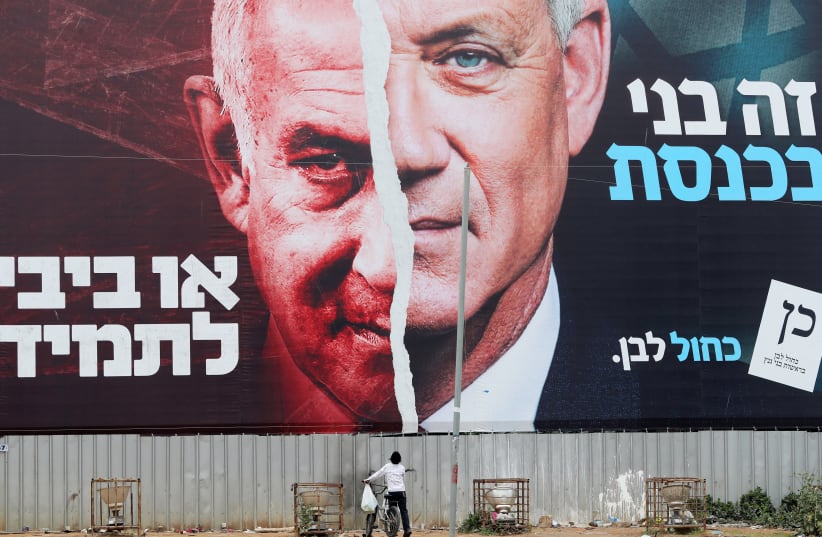
Against the backdrop of the ongoing Israel-Hamas War in Gaza and the sense of a slowdown in the confrontation with Hamas, combined with a lack of clarity in the Hezbollah conflict in the north, National Security Minister Itamar Ben-Gvir continues to strengthen as his Otzma Yehudit Party reached its peak since the last Knesset elections, receiving 9 mandates in the latest Maariv poll.
Despite the positive news for Otzma Yehudit, the picture is not improving for the governing coalition, which received only 44 mandates, compared to 71 for the opposition bloc, not including Minister Gideon Saar's New Hope Party. The survey also revealed that Likud remains at a low of 16 mandates, and United Torah Judaism would also suffer losses if elections were held today.
In response to the question, "If new elections were held for the Knesset today, who would you vote for?" the answers were: The National Unity camp – 39 mandates (39 in the previous survey), Likud – 16 (16), Yesh Atid – 13 (13), Yisrael Beyteinu – 10 (10), Shas – 9 (9), Otzma Yehudit – 9 (8), United Torah Judaism – 6 (7), New Hope – 5 (5), Ra'am – 5 (5), Meretz – 4 (4), Religious Zionist Party – 4 (4).
Balad (1.8%) and the Labor Party (1.4%) continue to be below the electoral threshold.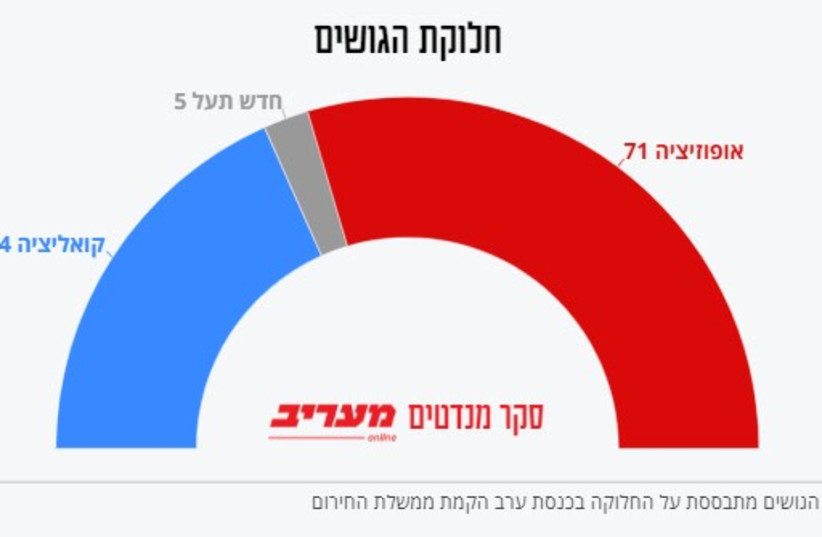
Who is more suitable for prime minister?
In response to another question, "Who, out of incumbent Benjamin Netanyahu or Benny Gantz, is more suitable to be the prime minister of Israel?" the answers were: Gantz – 50% (51% in the previous survey), Netanyahu – 31% (29% in the previous survey).
Another 19% answered – don't know. The breakdown shows that among Likud voters, Netanyahu received 62%, compared to 22% for Gantz and 16% who answered – don't know. In the National Unity camp, Gantz received 91%, Netanyahu 1%, and 8% answered that they don't know. In the Yesh Atid voters' battle, Gantz got 85%, Netanyahu – 1%, and 14% answered that they do not know. The survey, conducted on January 17-18, included 512 respondents, representing the adult population in Israel aged 18 and above, both Jews and Arabs. The maximum sampling error stands at 4.3%.
The poll was carried out by Lahav Research, led by Dr. Menachem Lazar, in collaboration with Panel4All.
Go to the full article >>Israel-Hamas War: What you need to know
- Hamas launched a massive attack on October 7, with thousands of terrorists infiltrating from the Gaza border and taking some 240 hostages into Gaza
- Over 1,200 Israelis and foreign nationals were murdered, including over 350 in the Re'im music festival and hundreds of Israeli civilians across Gaza border communities
- 132 hostages remain in Gaza, IDF says